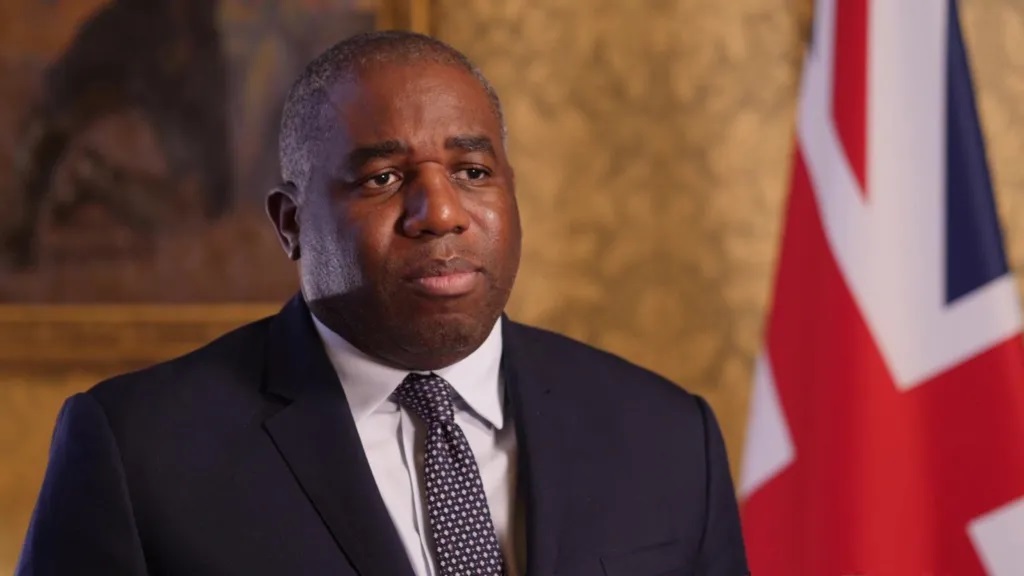Foreign
UK in diplomatic contact with Syrian rebels, says Lammy

UK Foreign Secretary David Lammy has said the British government has had “diplomatic contact” with the Syrian rebel group that toppled the Assad regime.
Lammy said Hayat Tahrir al-Sham (HTS) remains a proscribed terrorist organisation, but the UK “can have diplomatic contact and so we do have diplomatic contact, as you would expect”.
His US counterpart Antony Blinken said on Saturday that the US had made “direct contact” with the HTS rebels now in control of Syria.
Lammy’s remarks come as the government announced a £50m humanitarian aid package for vulnerable Syrians, including refugees in the region.
Speaking on Sunday, Lammy said: “We want to see a representative government, an inclusive government. We want to see chemical weapons stockpiles secured, and not used, and we want to ensure that there is not continuing violence.
“For all of those reasons, using all the channels that we have available, and those are diplomatic and of course intelligence-led channels, we seek to deal with HTS where we have to.”
The diplomatic contact with HTS does not mean the foreign secretary has personally been in touch with the rebel group.
Whitehall sources say the contact referred to is permitted under the terms of existing terrorism legislation, under which, for example, NGOs would be able to have contact in order to provide humanitarian assistance.
Such contact does not mean that the UK’s listing of HTS as a terrorist group is being lifted. But it does indicate that the UK government has embarked on a process of judging HTS on the basis of its actions.
Both the UK and the US have a vested interest in what happens next in Syria. Blinken told reporters on Saturday that the US interaction with HTS was in particular over the fate of the missing American journalist, Austin Tice.
The US State Department said Blinken and Lammy spoke on Sunday, as the secretary of state told the foreign secretary Washington will back “an accountable and representative” government in Syria, “chosen by the Syrian people”.
Asked whether HTS could be removed from the UK’s list of proscribed terror groups, Lammy said the rebel group remains a proscribed organisation that came out of al-Qaeda.
“Al-Qaeda is responsible for a tremendous loss of life on British soil,” Lammy said, adding: “We will judge them [HTS] on their actions, I won’t comment on future proscription but of course we recognise that this is an important moment for Syria.”
Earlier this week, Prime Minister Sir Keir Starmer said no decision had been made yet on HTS’s proscription status.
On the cash pledge to the Middle Eastern country, Lammy said it followed talks on Saturday in Aqaba.
Hosted by Jordan, delegates from several countries agreed on the importance of a “non-sectarian and representative government”, protecting human rights, unfettered access for humanitarian aid, the safe destruction of chemical weapons and combatting terrorism.
The talks were attended by the UK, US, France, Germany, the Arab Contact Group, Bahrain, Qatar, Turkey, the United Arab Emirates, the EU and UN.
HTS was not present at the meeting in Jordan.
However, everybody in Aqaba felt it was important to engage with HTS, and that engagement should be on the basis of humanitarian access and the principles outlined above.

The UK said £30m will be channelled within Syria for food, shelter and emergency healthcare, while £10m will go to the World Food Programme (WFP) in Lebanon and £10m to WFP and the UN’s refugee agency, UNHCR, in Jordan.
As well as the £50m in aid for Syrians in the region, the UK government said £120,000 of UK funding will be given to support the Organisation of the Prohibition of Chemical Weapons (OPCW) “to rid Syria of chemical weapons” and support the interim Syrian government.
The UK closed its embassy in Damascus in 2013, two years after the Arab Spring protests began to be brutally suppressed there by the Assad regime.
Between 2011 and 2021, more than 30,000 Syrians were granted asylum in the UK, but on Monday the Home Office said it was no longer possible to assess outstanding cases given the change in circumstances.
Last week, the HTS rebel group toppled Assad’s rule alongside allied rebel factions.
The Home Office later paused its decisions on Syrian asylum claims to the UK as the government has not determined whether Syria, under the new rebel-led authorities, is a safe country which people could be sent to.
The Assad family ruled Syria for more than 50 years. In 2011, Bashar al-Assad crushed a peaceful, pro-democracy uprising, sparking a civil war in which more than half a million people were killed and 12 million others forced to flee their homes.
More reports are now emerging of the cruelty of Assad’s regime and the suffering it inflicted on the lives of so many Syrians.
However, given the Islamist militant group’s previous affiliations with al-Qaeda, religious minorities in Syria and neighbouring countries worry about their future under HTS’s rule.
Foreign
Myanmar Quake Victim Rescued After 5 Days

Rescuers on Wednesday pulled a man alive from the rubble five days after Myanmar’s devastating earthquake, as calls grew for the junta to allow more aid in and halt attacks on rebels.
The shallow 7.7-magnitude earthquake on Friday flattened buildings across Myanmar, killing more than 2,700 people and making thousands more homeless.
Several leading armed groups fighting the government have suspended hostilities during the quake recovery, but junta chief Min Aung Hlaing said military operations would continue — despite international criticism of multiple reported air strikes.
UN agencies, rights groups and foreign governments have urged all sides in Myanmar’s civil war to stop fighting and focus on helping those affected by the quake, the biggest to hit the country in decades.
Hopes of finding more survivors are fading, but there was a moment of joy on Wednesday as a man was pulled alive from the ruins of a hotel in the capital Naypyidaw.
The 26-year-old hotel worker was extracted by a joint Myanmar-Turkish team shortly after midnight, the fire service and junta said.
Dazed and dusty but conscious, the man was pulled through a hole in the rubble and put on a stretcher, video posted on Facebook by the Myanmar Fire Services Department showed.
Call for peace
Min Aung Hlaing said Tuesday that the death toll had risen to 2,719, with more than 4,500 injured and 441 still missing.
But with patchy communication and infrastructure delaying efforts to gather information and deliver aid, the full scale of the disaster has yet to become clear, and the toll is likely to rise.
The World Health Organization (WHO) reported severe damage in the city of Sagaing, citing local rescuers saying one in three houses there have collapsed.
Healthcare facilities, damaged by the quake and with limited capacity, are “overwhelmed by a large number of patients”, while supplies of food, water and medicine are running low, WHO said in an update.
Sagaing has seen some of the heaviest fighting in Myanmar’s civil war, and AFP journalists have not been able to reach the area.
Relief groups say the overall quake response has been hindered by continued fighting between the junta and the complex patchwork of armed groups opposed to its rule, which began in a 2021 coup.
Julie Bishop, the UN special envoy on Myanmar, called on all sides to “focus their efforts on the protection of civilians, including aid workers, and the delivery of life-saving assistance”.
Even before Friday’s earthquake, 3.5 million people were displaced by the fighting, many of them at risk of hunger, according to the United Nations.
Late Tuesday, an alliance of three of Myanmar’s most powerful ethnic minority armed groups announced a one-month pause in hostilities to support humanitarian efforts in response to the quake.
The announcement by the Three Brotherhood Alliance followed a separate partial ceasefire called by the People’s Defence Force — civilian groups that took up arms after the coup to fight junta rule.
But there have been multiple reports of junta air strikes against rebel groups since the quake.
“We are aware that some ethnic armed groups are currently not engaged in combat, but are organising and training to carry out attacks,” said Min Aung Hlaing, mentioning sabotage against the electricity supply.
“Since such activities constitute attacks, the Tatmadaw (armed forces) will continue to carry out necessary defensive activities,” he said in a statement late Tuesday.
But the UN special rapporteur on human rights in Myanmar, Tom Andrews, rejected the junta’s characterisation of its operations.
“Senior General Min Aung Hlaing has described ongoing junta attacks in the midst of Myanmar’s suffering as ‘necessary protective measures’,” he wrote on X.
“They are neither necessary nor protective. They are outrageous and should be condemned in the strongest possible terms by world leaders.”
Rescue teams work to save residents trapped under the rubble of the destroyed Sky Villa Condominium development in Mandalay on March 29, 2025, a day after an earthquake struck central Myanmar. More than 90 people could be trapped inside the crushed remains of an apartment block in Mandalay in central Myanmar destroyed by a devastating earthquake, a Red Cross official told AFP on March 29 as rescuers worked to free the victims. (Photo by Sai Aung MAIN / AFP)
Thailand toll rises
Australia’s government decried the reported air strikes saying they “exacerbated the suffering of the people”.
“We condemn these acts and call on the military regime to immediately cease military operations and allow full humanitarian access to affected areas,” Foreign Minister Penny Wong said.
Amnesty International said “inhumane” military attacks were significantly complicating earthquake relief efforts in Myanmar.
“You cannot ask for aid with one hand and bomb with the other,” said the group’s Myanmar researcher Joe Freeman.
Hundreds of kilometres away, in the Thai capital Bangkok, workers continued to scour through the rubble of a collapsed 30-storey skyscraper.
The structure had been under construction when the earthquake hit and its crash buried dozens of builders — few of whom have come out alive.
The death toll at the site has risen to 22, with more than 70 still believed trapped in the rubble.
AFP
Foreign
Badenoch cautions UK to refrain from retaliating if Trump imposes tariffs

Kemi Badenoch has cautioned Britain against retaliating if Donald Trump imposes new tariffs on UK goods as part of his “liberation day” trade measures.
The Conservative leader stressed that import levies “just make everyone poorer” and urged Labour ministers to push for a “comprehensive” trade deal.
Despite efforts by Prime Minister Sir Keir Starmer and Business Secretary Jonathan Reynolds to secure an exemption, UK goods are expected to be hit alongside other global imports.
Badenoch emphasised the need for a deal covering key industries like manufacturing, particularly steel and automotive, warning that tariffs would “severely cripple” these sectors.
“Some people will want us to have trade retaliation, that just makes everyone poorer,” she told LBC. “This is a time for significant diplomacy… the people who will suffer aren’t just our exporters but also the American consumer.”
She dismissed suggestions that the UK should distance itself from the US due to Trump’s policies, stating,
“My view is that we need to stick closely to the US, they are an ally.
“We do not want a world where Nato is fragmented, that is very bad for our national security.
“We need to do what is in our national interest; where we disagree we should say so and I don’t mind people saying where they disagree.
“But I do have a problem with people just criticising for the sake of it when they actually haven’t got a concrete example of what it is that they are talking about in terms of policy. They are expressing their personal views about an individual.
“I haven’t banned anyone from doing so but I don’t think it is right because … having people from another country endlessly criticise your government in the open is not helpful.”
Trump has already announced a 25% import tax on foreign cars, dealing a major blow to the UK auto industry, which exported over 101,000 units worth £7.6 billion to the US last year.
Additionally, new tariffs—potentially including a 20% tax—are set to take effect on April 2, targeting UK products in response to VAT rules Trump views as unfair.
These levies could disrupt the UK’s economic plans, coming shortly after Chancellor Rachel Reeves’ budget cuts aimed at stabilizing public finances.
Foreign
Journalists rally against White House’s decision to modify allocation of seats in briefing room

The White House said Monday it is “seriously considering” taking control of deciding which journalists get seats in the famed briefing room, in the latest bid by President Donald Trump’s administration to exert power over the media.
The 49 spots in the press room, where spokespeople, officials and occasionally the president take the podium, have long been allocated by the non-partisan group of independent journalists, the White House Correspondents Association.
White House Press Secretary Karoline Leavitt accused the WHCA of trying to maintain a “monetized monopoly over the briefing room.”
“As for switching up seating in the briefing room, it’s something we are seriously considering,” she told Fox News.
“The briefing room is part of the People’s House, it belongs to the American people. It does not belong to elitist journalists here in Washington DC.”
News outlet Axios reported earlier that the White House wanted to take control of the seating chart to give more prime front-of-room spots to new media, and move some legacy outlets further back.
The WHCA, of which AFP is a member, opposed the “wrong-headed” move.
“The reason the White House wants control of the briefing room is the same reason they took control of the pool: to exert pressure on journalists over coverage they disagree with,” WHCA President Eugene Daniels said in a statement.
The WHCA and the White House both said they had tried to broker a meeting on the issue.
It is the latest effort by the White House to shape who covers Trump after taking control from the WHCA in February of the “pool” that covers the president in the Oval Office and when he travels on Air Force One.
The White House has added access to the pool for new and in several cases openly pro-Trump media, while reducing access to mainstream organisations.
It also continues to bar the Associated Press news agency from almost all presidential events as it refuses to refer to the Gulf of Mexico as the “Gulf of America,” the name newly decreed by Trump.
AFP
-

 News11 hours ago
News11 hours agoRivers APC demands Fubara’s probe over ex-HoS allegations
-

 Business24 hours ago
Business24 hours agoBank stops transfer fees on online transactions
-

 Economy3 hours ago
Economy3 hours agoSEE Black Market Dollar To Naira Exchange Rate Today 3rd April 2025
-

 News24 hours ago
News24 hours agoS/African Court Acquits Nigerian Pastor Of Rape, 31 Other Charges
-

 News4 hours ago
News4 hours agoNatasha: Kogi PDP hammers Ododo, reiterates unfeigned support for her
-

 Economy12 hours ago
Economy12 hours agoNaira rebounces against the dollar in parallel market
-

 News2 hours ago
News2 hours agoJust in: INEC dumps recall petition against Sen Natasha
-

 News10 hours ago
News10 hours agoAir Algerie Inaugural Flight to Abuja Will Strengthen Nigeria-Algeria Ties – FG
















